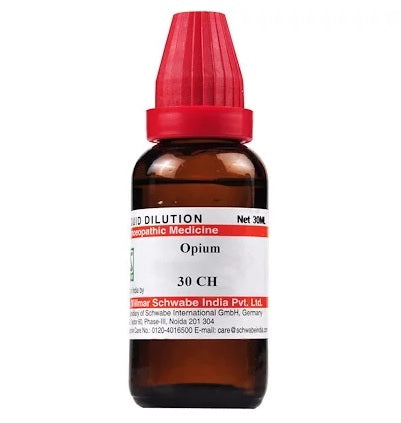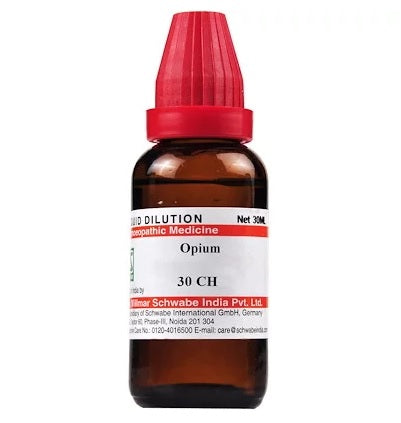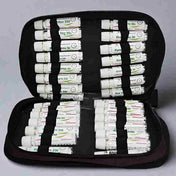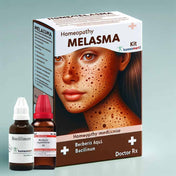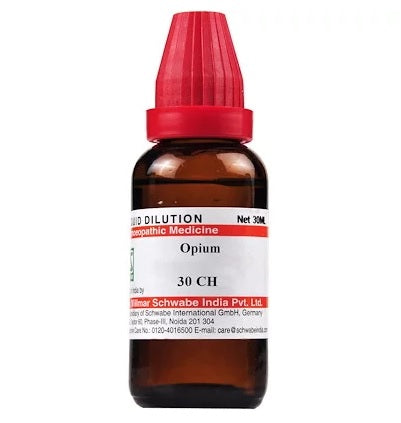Opium Homeopathy Dilution 30C, 200C, 1M, 10M
Opium Homeopathy Dilution 30C, 200C, 1M, 10M - Schwabe / 30 ML 30C is backordered and will ship as soon as it is back in stock.
Couldn't load pickup availability
Description
Description
About Opium Homeopathic Dilution
Also known as Laudanum, Dried Latex of the Poppy (Papaver Somniferum)
Opium is the gummy exudation of the unripe capsule of the poppy.
Common Name: Papaver somniferum, Poppy
Clinical Indications for Opium
- Opium is one of the chief remedies for foetal movements when they become excessive.
- Sleep follows the convulsions. Loud snoring indicates this remedy.
- Sleepy but cannot sleep, sleepless with acuteness of hearing.
- Sensation of swelling of body, trembling, shocks, and convulsive movements of the muscles of the face.
Opium produces insensibility of the nervous system, depression, drowsy stupor, painlessness, general sluggishness and lack of vital reactions. The complaints are accompanied by heavy stupid sleep and stertorous breathing. Opium lessens the voluntary movements, contract pupil, depresses higher intellectual functions, and lessens self-control and power of concentration. It stimulates the imagination.
Opium is very effective for loss of senses related to taste and smell. It also addresses emergence of phantom oral sensations (olfactory hallucination) and Parosmia ( distorted smell perception) which some patients suffer. Opium find popular application in deliriums, uncontrolled twitchings etc
Opium 30 is prescribed when the patient have delirium tremors over and over again from alcohol ill-effects says Dr KS Gopi. Expression of fright or terror on face. Breathing strenuous, visions of animals and ghosts with uneasy sleep.
Opium Overview in Materia Medica
General Properties: Opium is a profound remedy in homeopathy, often more challenging to gauge than most due to its significant impact on the nervous system. It’s primarily indicated for conditions characterized by insensitivity, stupor, and a lack of vital reactions. Opium symptoms include painless states, heavy sleep, and general sluggishness, making it suitable for a variety of severe health states.
Key Symptoms and Indications:
- Deep, heavy sleep with stertorous breathing.
- Facial appearance is dark, mahogany-brown; skin feels sweaty.
- Used for conditions like serous apoplexy and passive venous congestion.
- Effective for diseases stemming from fright, with symptoms worsening from heat.
Mental and Emotional Symptoms:
- Lack of consciousness and complete disorientation.
- Experiences frightful fancies and may have delirious talking with eyes wide open.
Physical Symptoms and Actions:
- Head: Heavy, dull sensation with possible vertigo, particularly after fright.
- Eyes: Pupils may be half-closed, dilated, or contracted.
- Face: Appears red, bloated, and may have spasmodic twitching.
- Mouth: Typically dry with possible black, paralyzed tongue and intense thirst.
- Stomach and Abdomen: Symptoms include vomiting, possibly with colic and convulsions, and a bloated abdomen.
- Respiratory: Breathing issues include needing to be shaken to restart breathing upon falling asleep, and snoring respiration.
- Sleep: Profound coma or heavy sleep, with the person being extremely drowsy but unable to sleep.
Dosage:
- Recommended from the third to thirtieth and up to 200th potency, depending on the case specifics.
Comparisons and Antidotes:
- Compare with remedies like Apis, Belladonna, and Gelsemium.
- Antidotes for acute poisoning include Atropine and Black Coffee, while chronic use may be counteracted by Ipecac and Nux Vomica.
Non-Homeopathic Uses:
- Opium is used palliatively in non-homeopathic settings for severe pain, sleeplessness, and to control excessive secretions in conditions like diarrhea and diabetes.

